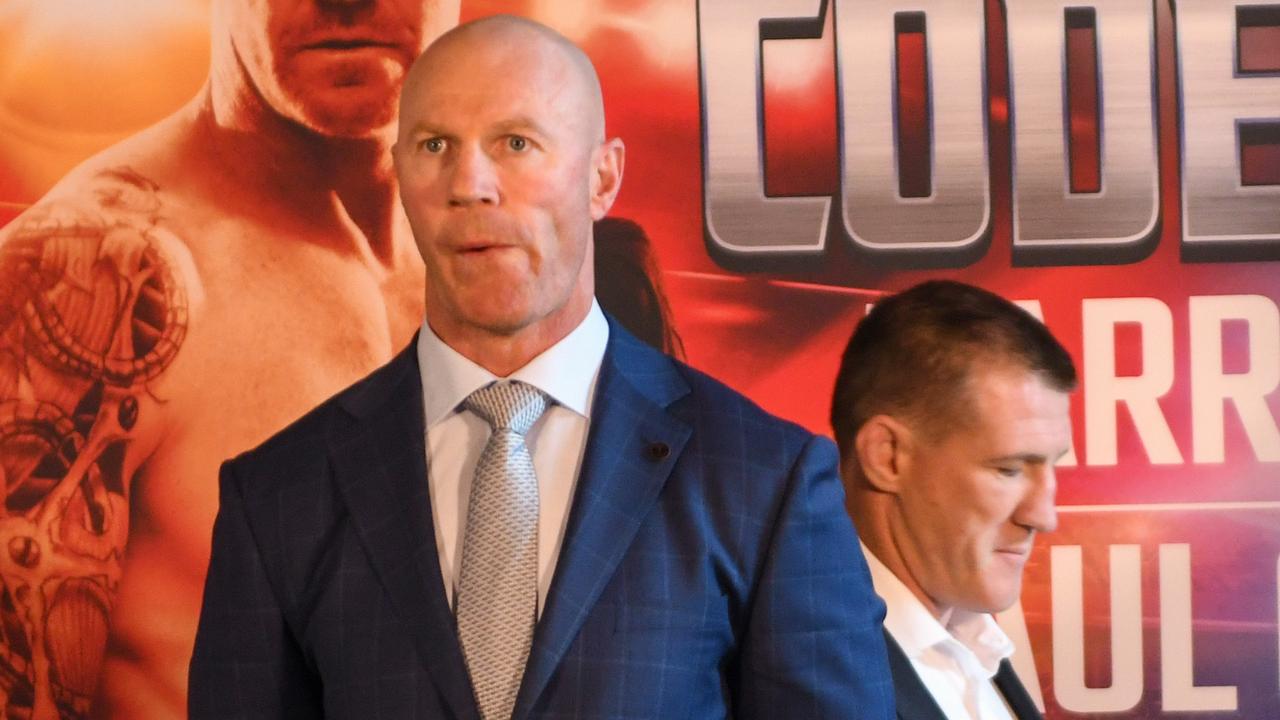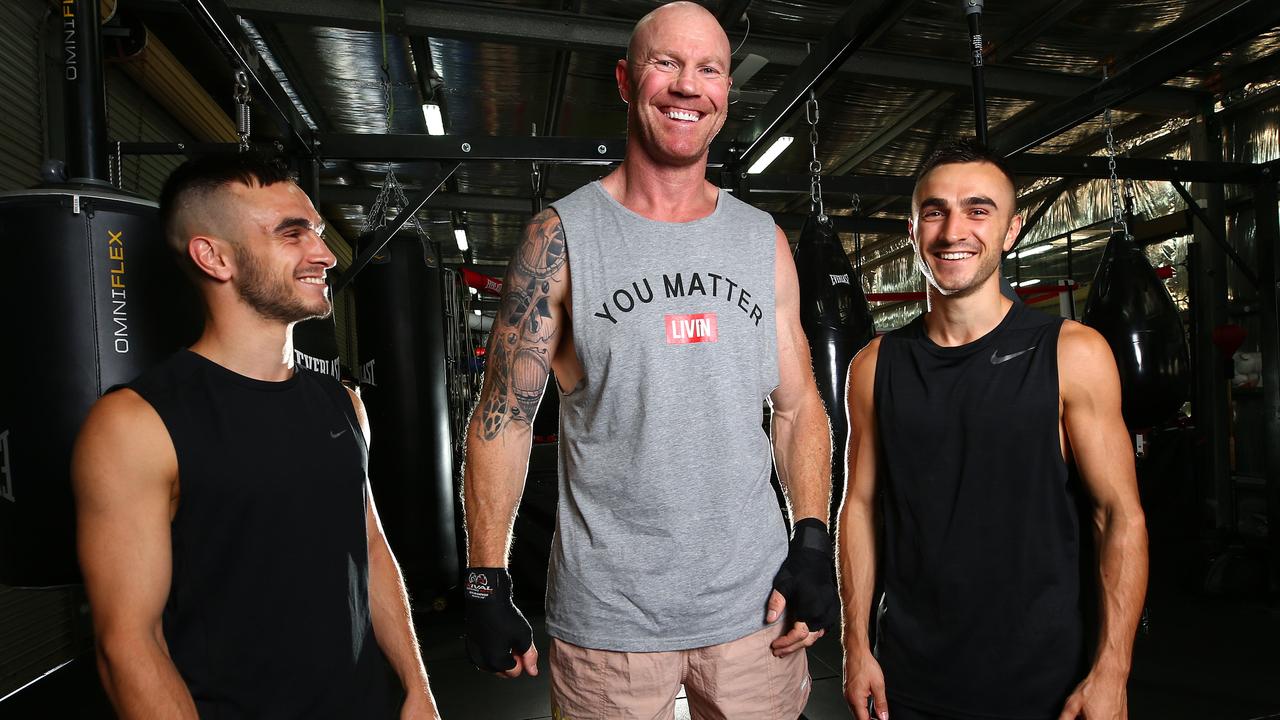Luke Beveridge is a caring coach who always has his players’ backs
LUKE Beveridge was busy working on the Western Bulldogs’ plans for the NAB Challenge series when his world was rocked. He received news he had lost one of his players.

AFL
Don't miss out on the headlines from AFL. Followed categories will be added to My News.
LUKE Beveridge was busy working on the Western Bulldogs’ plans for the NAB Challenge series last month when his world was rocked.
He received news he had lost one of his players.
It wasn’t a pre-season injury, or a problem at a football club that could be resolved.
This was the loss of a mate in the most heartbreaking of circumstances.
One of the men Beveridge had coached and played with at St Bedes/Mentone Tigers in the VAFA had taken his own life.
The mate in question had been a crucial member of the club’s C-Grade and B-Grade premierships in 2006 and 2007, before playing in the reserves as Beveridge coached the senior team to the A-Grade flag in 2008.
Even now, six weeks on, as Beveridge gears up for his second season as Western Bulldogs coach, starting on Sunday against Fremantle at Etihad Stadium, he is still deeply affected.
His eyes well for a moment, then adds with purpose and perspective: “I wouldn’t be here if it wasn’t for people like that. I am so thankful and appreciative of that.
“We were really close. It just shows the attachment you have to people in football. He was a prime example of what all those players did during that period.”
Ask anyone about Luke Beveridge and the overwhelming response you get from those around him is that he cares.
Cares about his family, his players, his football club and his mates — those who have been with him on a football journey that stretches back to when he was a kid.
His playing journey covered 118 games and three AFL clubs, but he connected with each of those clubs, one of them being the Bulldogs.
His coaching genesis was with St Bedes/Mentone, and the relationships forged with his players there acted as a template for his experiences in player development and assistant coaching roles at Collingwood and Hawthorn, and now as senior coach of the Western Bulldogs.
That hasn’t changed, even after winning the AFL Coaches Association’s Coach of the Year award in 2015, and helping lift the Bulldogs to what some saw as an unlikely finals appearance.
Examples of his connection to his playing group are everywhere.
Matthew Suckling almost certainly wouldn’t be at the Whitten Oval now if it had not been for his bond with the coach.
When the premiership Hawk was weighing up his options last year, a text message from Beveridge — who had acted as a sounding board through Suckling’s serious knee injury in 2013 when he was an assistant coach at Hawthorn — was enough to seal the deal.
Easton Wood credits Beveridge for his breakout season last year, as do a host of other Dogs whose engagement with their coach is visible on many levels.
Even club president Peter Gordon extolled those virtues, crediting the resurgent 2015 season to the coach’s direction, for bringing the group closer, for implementing a brand of football capable of beating the best, and for setting the pathway for the future.
Beveridge, though, credits the players as much as anything else. Even when asked this week about importance of the club reaching 30,000 members, he brings it back to them.
“They are the ones who are under the most pressure and they are the ones who, for the most part, got the job done last season,” Beveridge said.
“We’ve got some great people in all areas of this football club. But we feed off the players. Ultimately, they are the ones who established the momentum within the club.”
The Bulldogs were one of the inspiring stories of 2015, playing a relentlessly paced brand of football that blended one of the best young lists in the AFL with some hardened experience.
Fourteens wins came from 23 matches, the run only halted by a seven-point elimination final loss to Adelaide that was one of the games of the season.

It’s a game Beveridge has dissected forensically, even if he initially mulled over how best to address it with the players to ensure a different result the next time.
“It was a huge opportunity missed, but my emotion was for the playing group, and for the fans,” he said.
“The fans have been on this journey with us, and it was like ‘we want one more (game) and who knows what might happen’.
“I definitely wasn’t bitter and twisted, but I did look at it with my auditor’s hat on. I stewed over how the review should transpire and I did seek some counsel on it.”
The one-time Australian Taxation Office employee forensically pinpointed 80 moments that may have changed the result and went through a thorough review in the club’s lecture theatre on the first day of the preseason.
They dissected the instances not as part of a blame-game, but to construct a platform for 2016.
“There wasn’t a theme ... we were all surprised at the quantum of things, whether it was defensive breakdown — and by that I mean across the whole field, not just in the back end — and the opportunities missed with the ball.
“In totality, which we don’t normally do, we sat there and looked at 80 instances of the game and thought if we could just get 10 of those back, the margin might have gone the other way.”
The players had their input, and Beveridge is confident the cathartic nature of the review will assist them now and into the future.
He knows some critics have forecast the Bulldogs as the ‘Port Adelaide’ of 2016 — a team that had second-year blues after a surprising everyone the year before.
But Beveridge, 45, says that’s not only unfair on the Power, who had injury issues last year, but that his team has its own identity.
He sees more growth this season, saying he would never put a ceiling on what the club can achieve.
“When you look at say a Fremantle side, and a Hawthorn side, that have played a lot of AFL games, there is a theory that they are better prepared to play for longer periods,” he said.
“I haven’t bought my subscription there. It might be slightly tilted in their favour, but that doesn’t mean we can’t challenge that ideal. We believe we can.”

But Beveridge has never been one to make outlandish statements or predictions. He knows AFL football is too cruel a beast for that.
“You know there are games when your whole group hasn’t brought their best intent. We only had a couple of games like that last year, probably the Melbourne game at the MCG, and another later in the season,” he said.
“You only need a couple of players slightly off or who are carrying some sort of injury concern that doesn’t come up to speed, and that can compromise things.”
That’s why he is happy to start off with a difficult fixture against the Dockers.
“It is going to be a great challenge,” he said. “You know you are going to get that immediate fierceness at the contest and you have to be able to match that.”
One of the most telling moments for Beveridge last year was not the string of wins, but a four-game losing stretch between Rounds 6-10.
“(In that time) you are looking around at the people around you — your players, your support staff and the administration — for how people will respond and react. In the end, it was quite a positive period,” he said.
“No one moved away from the course we had started to chart, that was a little test. We haven’t had a significant test; we hope we never have one.
“But we know the demands on each other will go up because we want to achieve a bit more. We hope the players can feel that too, as they will demand more of each other, so that they can push each other to new levels of performance.
“I believe in our people. I rely on our people, and they have been a great support to me.”
Regardless of what happens — just as all those who have had interconnecting journeys with Beveridge over the years — the Western Bulldogs players know the coach will always have their back.
glenn.mcfarlane@news.com.au
BEVO IN BRIEF
THE RECRUITMENT OF MATTHEW SUCKLING
“I’ve got a lot of respect and admiration for the way he plays, and we are really fortunate to have him at our club.
“The great thing for him and for us is there is no role that stands out. He can play on all three lines (defence, midfield and attack).”
THE RETURN OF TOM LIBERATORE
“The game, in a year, moves on and when you come back from an ACL, you have to catch up. So in these early periods he is looking OK, but it will take him some time to start influencing games.”
JAKE STRINGER RATED NO. 10 IN MARK ROBINSON’S TOP 50
“It’s a forecast, isn’t it? He prepares himself really well. He is that little bit stronger. Jake, right, is like a lot of our younger players – he still has a bit of work to do on his game, but he hasn’t missed a beat (this preseason).”
MARCUS BONTEMPELLI
“(North Melbourne’s) Ben Jacobs had a lot of scalps last year and he got (Trent) Cotchin in that final. But ‘Bonti’ was our best player (on Jacobs) and the most influential player on the ground in our Round 22 game against the Kangaroos. That is a real indication of a 20-year-old influencing the game.”
HIGH-PRICED YOUNG FORWARD TOM BOYD
“I think he will have a good year. He assures me that he doesn’t take a lot of notice (of the criticism). I am not sure if that is true, but we are seeing some really positive signs.”
BANNED BULLDOG STEWART CRAMERI
“I ring him every couple of weeks. He needs to feel like the social and relationship side of his connection to the club is still strong. He can’t be here in any other form. I feel for him, and I feel for (banned player welfare manager) Brent Prismall.”
THE TALIA CONTROVERSY
“We shot ourselves in the foot in that Adelaide played a pretty good brand of football. The allegations (that then Bulldog and now Swan Michael Talia provided information to his Crows brother Daniel, which he was cleared of by the AFL) didn’t eat away at us because of the result. But because the accusation was out there, and because we knew he wasn’t accepting a contract deal, we had to inform the peak body, the AFL, because there were going to be trade talks.”


 We’ve got some great people in all areas of this football club. But we feed off the players. Ultimately, they are the ones who established the momentum within the club.
We’ve got some great people in all areas of this football club. But we feed off the players. Ultimately, they are the ones who established the momentum within the club.

